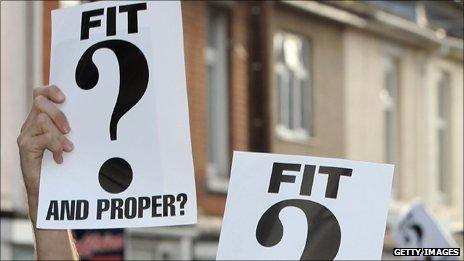Government tells English football: change or be changed
- Published

Collective debt of clubs in England's top four divisions is said to stand at 拢3.5bn.
The Football Association has been given an "absolute deadline" to bring in rules tackling debt levels at clubs or face government action.
MPs have already demanded sweeping changes to the way football is run.
And now a deadline of 29 February has been imposed for the FA to overhaul its board and bring in a new licensing system for clubs.
Reforms can help England win World Cup - Sports Minister Hugh Robertson
"[Football's] governance has failed to keep up with the modern game," said Sports Minister Hugh Robertson.
"If football proves unable to sort this out itself then the government may have to legislate.
"I'm not keen on that idea because I've always believed very strongly that sport, not government, should run sport in this country.
"It is an absolute deadline for them to bring forward proposals to say how they're going to implement this report."
The Government has made a number of demands in its response to a select committee report on football governance.
The report from MPs in July demanded the level of debt be addressed in the English game, with that "significant changes need to be made to the way the game is run to secure the future of England's football heritage".
Ministers say there should be a role for the FA on finances, working with the leagues, to protect the game.
"The Government shares the concern expressed by the committee at the extent of losses and the number of clubs on the edge of viability," said the Government response.
"Debt per se is not always a bad thing, but it must be genuinely sustainable and should be assessed as a percentage of turnover.
"Government believes that there is a legitimate role for the national governing body, working hand in hand with competition organisers, to ensure that appropriate and consistent checks and balances are in place to protect the overall financial integrity of the national game and its long-term viability.
"The recent moves by the Football League to work towards a break-even rule in the Championship are a welcome indication of the appetite amongst many clubs for a change."
The Government identified three "immediate priorities" for action: a complete restructuring of the FA Board; the implementation of an FA-administered licensing system for the professional game; and significant changes to the make-up and processes of "football's parliament", the FA Council.
The FA Board is currently made up of FA chairman David Bernstein, general secretary Alex Horne and five representatives from the professional game (the Premier League and Football League) and five from the national game (the county FAs).
With conflicts of interest and historic feuds usually making this structure unworkable, the Government wants the board to be comprised of Bernstein, Horne, two more FA executives, two independent directors, two from the leagues and two from the counties.
The reforms demanded of the council are a reduction in length of tenure and the introduction of more women, more councillors from ethnic minorities, more ex-footballers and more representatives of supporter groups.
The proposed licensing system is intended to build on the two leagues' recent efforts to put in more safeguards against financial mismanagement, asset-stripping owners, tax avoidance and other related sins.
This idea will be backed by many in the game but the leagues are unlikely to welcome any interference in their affairs from the FA.
In words that will come as great encouragement to Supporters' Direct, the organisation that helps fans form supporter trusts and pushes for representation on club boards, the Government has criticised the recent threat to its funding and backed its work.
But the Government has been more nuanced in its recommendations for reform of the "Football Creditors Rule", the infamous measure that states clubs, leagues and players must be paid first and in full when a team goes bust, while everybody else must settle for pence in the pound.
The Government has called for a more "appropriate and modern solution" but stopped short of saying it would scrap the rule.
A joint FA, Premier League and Football League statement said they were grateful to ministers for their recommendations and would now take time to consider "what the most appropriate actions might be".
For the latest updates and reaction to this story, read . Have your say on Twitter via the hashtag #bbcsportsday.
- Published10 June 2011